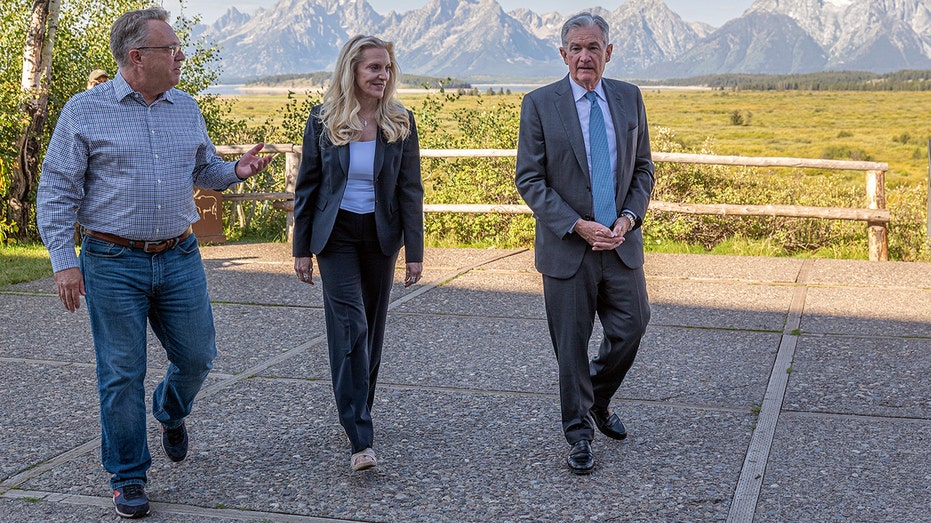Fed's Powell pledges to combat inflation 'forcefully,' but warns of economic pain ahead
In pivotal Jackson Hole, Wyoming, speech, Powell delivers a hawkish message on inflation
Powell to send message Fed will 'stay the course' on inflation
Amberwave Partners co-founder and portfolio manager Dan Katz advises not to 'load up' on stock leading up to Federal Reserve Chairman Jerome Powell's speech from Jackson Hole, Wyoming.
Federal Reserve Chairman Jerome Powell on Friday delivered a stark message on the state of the U.S. economy at the annual central bank gathering in Wyoming: Inflation remains painfully high, and cooling it will require forceful action that could soon bring "pain" to households and businesses nationwide.
In his hotly anticipated speech at the Kansas Federal Reserve's Jackson Hole symposium, Powell reiterated a pledge to "forcefully" fight inflation that is still running near the hottest pace in 40 years and wrestle it closer to the Fed's 2% goal.
"While higher interest rates, slower growth and softer labor market conditions will bring down inflation, they will also bring some pain to households and businesses," he said. "These are the unfortunate costs of reducing inflation. But a failure to restore price stability would mean far greater pain."
Even with four consecutive interest rate hikes, including two back-to-back 75-basis-point increases, Powell stressed that the Fed is not in a place to "stop or pause" — an unwelcome sign for investors who were predicting a rate cut next year.
FED RAISES INTEREST RATES BY 75 BASIS POINTS IN ANOTHER HISTORIC MOVE TO TACKLE INFLATION
The current benchmark federal funds range of 2.25% to 2.50% is around the "neutral" level, meaning that it neither supports nor restricts economic activity. But the Fed chief signaled that a restrictive stance will almost certainly be necessary as the central bank tries to pump the brakes on the economy.
"We are moving our policy stance purposefully to a level that will be sufficiently restrictive to return inflation to 2%," Powell said, suggesting that "restoring price stability will likely require maintaining a restrictive policy stance for some time. The historical record cautions strongly against prematurely loosening policy."
Powell's comments confirmed that the Fed remains determined to fight inflation and slow consumer demand, even if it means failing to achieve the elusive soft landing and triggering a recession.

From right, Jerome Powell, chairman of the Federal Reserve; Lael Brainard, vice chair of the board of governors for the Federal Reserve System; and John Williams, president and CEO of the Federal Reserve Bank of New York, during a break at the Jackso (David Paul Morris/Bloomberg via Getty Images / Getty Images)
A growing number of economists and Wall Street firms are already forecasting an economic downturn this year or next, after economic growth contracted in the first two quarters of the year.
Hiking interest rates tends to create higher rates on consumer and business loans, which slows the economy by forcing employers to cut back on spending. Mortgage rates have nearly doubled from one year ago to 5.55%, while some credit card issuers have ratcheted up their rates to 20%.
"In essence, Powell is clearly stating that right now, fighting inflation is more important than supporting growth," said Jeffrey Roach, the chief economist at LPL Financial.
Stocks sold off sharply on Friday after Powell's speech, with the Dow Jones Industrial Average tumbling more than 800 points and the S&P 500 dropping more than 2%. The Nasdaq Composite slid 2.77%.
| Ticker | Security | Last | Change | Change % |
|---|---|---|---|---|
| I:DJI | DOW JONES AVERAGES | 49395.16 | -267.50 | -0.54% |
| I:COMP | NASDAQ COMPOSITE INDEX | 22682.729157 | -70.91 | -0.31% |
| SP500 | S&P 500 | 6861.89 | -19.42 | -0.28% |
It's unclear what the rate hike trajectory could look like over the next year. Powell said that Fed officials will be watching forthcoming economic data closely in making their decisions. A majority of traders have priced in a third 75-basis-point rate hike when policymakers meet at the end of September, according to the CME Group's FedWatch tool, which tracks trading.
Although inflation moderated slightly in July — the Fed's preferred gauge to track price growth fell 0.1% on a monthly basis — Powell said that it is not enough to determine that policymakers' tightening mission has been successful.
CLICK HERE TO READ MORE ON FOX BUSINESS
"While the lower inflation readings for July are welcome, a single month’s improvement falls far short of what the Committee will need to see before we are confident that inflation is moving down," he said.





















